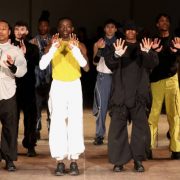Black Founders, The Influencer Bubble and AI – Why the Fyre Festival Fiasco is a Sign of Things to Come

As an Entrepreneur myself, the finesser in me was somewhat inspired by the ability of Billy McFarland, the Founder of the now ill-fated Fyre Festival, to walk into a room full of investors and persuade them to invest in his ideas. The extent to which the network of investors that he had around him supported his vision and backed him as a founder to the very end, to me, suggests that he did not actually need to rely on fraudulent means to make things happen. His charm, his track record (on paper), and his white male privilege would have been enough for him. If only it was as easy for Black founders to navigate such spaces – would Ja Rule, the other co-founder, acting alone, have had the same results that Billy had if he was in Billy’s position? An interesting thought.
Influencer marketing as a paradigm has only really existed since the mark of the 21st century and has largely taken off in the latter half of the last decade. Brands such as Gymshark and Fashion Nova have been able to achieve global status by utilising partnerships with influencers to great success. A number of more established brands have also begun to embrace the viability of influencer marketing as a tool for reaching their audiences – stepping away and diverting resources from print and some of the more traditional methods. But what is an influencer?
Forbes defines an influencer, quite simply, as:
influencer
/ˈɪnflʊənsə/
noun
“Someone who helps other people buy from you”.
To some, the terms ‘influencer’ and ‘blogger’ are largely synonymous or at least heavily related (I disagree); others see ‘influencer’ as a title in its own right; others believe that the title denotes something a little more fluid and vague. To me, an influencer is someone with a position of influence in a particular field who has effectively managed to leverage their persona or profile in that space for continued financial gain. They may not necessarily be a ‘celebrity’, and their continued influence is not wholly dependent on their social media ‘following’ or engagement. The likes of Jacqueline Shaw of Africa Fashion Guide and Jamal Edwards of SBTV spring to mind. To predicate influence on following is to conflate influence with popularity. A distinction is to be made from the term ‘social media influencer’, which refers to someone whose ‘influencer’ status is intrinsically tied to their social media following. Their continued engagement with their audience on their chosen platforms maintains their relevance and, as a consequence, their ability to monetise their presence. It is a behaviour-focussed concept.
“To me, an influencer is someone with a position of influence in a particular field who has effectively managed to leverage their persona or profile in that space for continued financial gain.” – Aji Ayorinde
Fyre Festival was a music festival that was scheduled to take place in late April/May 2017 in the Bahamas. With the likes of Major Lazer and Kanye West’s collective ‘G.O.O.D. Music’ purportedly on the line-up, it was promoted as being the next Coachella. On paper, it was not a completely infeasible idea; a number of leading festivals have been hosted in semi-remote locations within the last decade. Festivals such as the world-renowned MTN Bushfire Festival, which takes place in eSwatini (formerly Swaziland) or Oppikoppi Festival, which takes place in the Limpopo region of South Africa, have enjoyed great annual success. Fyre Festival, however, was hugely unsuccessful, due to a combination of poor planning, fraud, and dishonest advertising, as confirmed in a recent documentary about the festival, released on Netflix in 2019. It has culminated in a number of lawsuits, criminal fines and a criminal sentence.
The other recent documentary about the festival, aired on the platform ‘Hulu’, which I was fortunate enough to also watch, featured interviews with Billy Macfarland himself and took the approach of focussing more of their attention on the actual actions of the perpetrators of the fraud. It sparked a debate about the potential level of complicity of the influencers and other stakeholders involved in marketing and the organisation of the festival. Interestingly, it also further reminded us of the fickleness of the social media user, and how fragile a position in society the ‘social media influencer’ actually occupies.

The involvement in the marketing of Fyre Festival of celebrities, models and influencers more influential than the typical social media influencer who, quite often insecure in their very being and with aspirations of being true celebrities in their own right, created and perpetuated a cycle of ‘smoke and mirrors’ which masked and far outweighed the lack of inherent substance in the movement that they were endorsing. Fyre Festival appealed to a particular type of individual.
https://twitter.com/AjiAyorinde/status/1087355098836226048
One could further extrapolate that a Fyre Festival was bound to happen at some point. The reality-distorting hype bubble that burst when the organisers of the festival found themselves unable to deliver on their flaky promises is a mere microcosm of the social media bubble more generally. It is indicative of what is set to happen when the world discovers and decides upon its next preferred marketing tool and who the casualties of that discovery may be.
The influencer market is already heavily saturated. With the work on social media of the likes of fictional characters Lil Miquela and Blawko, AI-powered social media influencers who have taken the concept of brand-avatar collaboration that virtual band Gorillaz pioneered one step further, beginning to gain traction, it could be suggested that those in the know are already looking to move on from influencer marketing as we know it. Social media influencers may consider diversifying their skills portfolios or risk being left out of pocket.
A page has been set up to support the real victims of the Fyre Festival fiasco – Bahamian contractors who to this day remain unpaid for work done in preparation for the failed festival. To support, click here.





![ZINO VINCI’S ‘FILTHY & DISGUSTING’EP BRINGS YOU TO THE CORE OF THE ARTIST [@ZinoVinci]](https://guap.co/wp-content/uploads/2023/10/Zino-4.jpg)





![Remel London’s [@Remel_London] “Mainstream” is a must attend for upcoming presenters!](https://guap.co/wp-content/uploads/2017/02/REMEL-LONDON-FLYER-FINAL-YELLOW-COMPLETE-1.png)